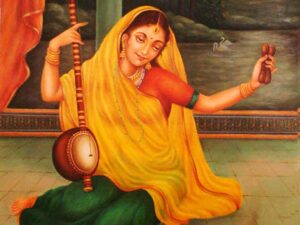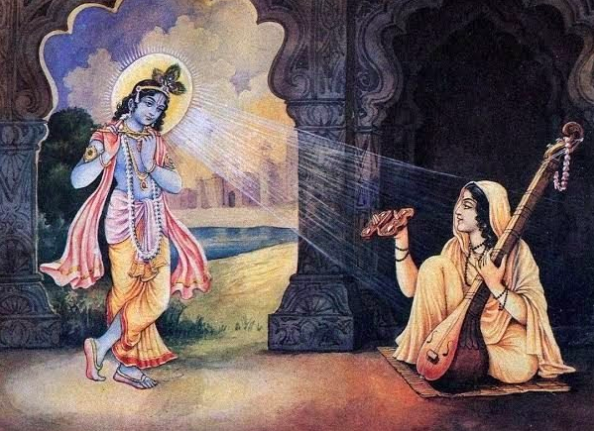The devotee beyond comprehension:
Mihira, popularly known as “Meera” was a great devotee of Lord Krishna and a Hindu poetess of the 16th century.
Born in a royal Rajput family in Rajasthan, she was originally named “Mihira” at her birth; but she introduced herself in the poetic world with the name Meera, gaining popularity with that name there onwards.

She was a cherished figure in the Hindu society, also widely known in the Bhakti movement culture. Meera bai is often referred in various scriptures as a fearless devotee of Lord Krishna, considering Krishna as her husband. She has been mentioned in various folk tales and adulatory legends, which are widely different in facts and details.
In the Indian spiritual history, innumerous devotional hymns are considered as compositions of Meera bai; but only a few hundreds are believed to be her originals and authentic by various scholars. Many hymns and poems attributed to her are likely to be written later by her followers and admirers.
Chittorgarh fort temple, and many such others are built in the memory of Meera Bai. The Bhajans or hymns composed by her and about her are popular here.
Meera And Her Lord Krishna:
There is a unique tale of Meera mentioned in various books, which is still popular in India as a great love story.
Meerabai was born in 1498 in a Rajput family of Rajasthan. She was the daughter of Ratan Singh and mother, Veer Kumari. Meera had been a great devotee of Lord Krishna from her early childhood. She was just 4 year old, when once seeing a wedding ceremony happening nearby, she asked her mother who would be her groom!
Hearing her innocent question, her mother smiled and pointed to the idol of Krishna. But this got imbibed in Meera’s mind. Even when she grew up, she believed that Sri Krishna would marry her. She was beautiful and peaceful at heart. Eventually she had to marry Rana Sanga on the insistence of her family. But Meera’s love and devotion for Krishna did not diminish.

Meera made a routine of visiting the temple of lord Krishna after completing her daily chores at her in-laws, and used to worship her lord there. She sang hymns and poems in His praise in her sweet voice. Her love for lord Krishna was disliked by her in-laws, and her mother-in-law compelled her to worship Durga Maa as they all did. Unable to agree with them, she openly declared her commitment and surrender of her life to Krishna. Her sister-in-law Udbai, told her brother, Rana that Meera was having an affair with some; hearing this he went to the temple to check out on Meera with his sister at midnight.
On seeing Meera talking to the idol of Krishna at the temple, her husband furiously shouted at her demanding to bring her lover in front of him, with whom she’s having the affair.
Pointing towards the idol of lord Krishna, Meera expressed that He is her owner, and that she is married to her lord. Rana was heartbroken on knowing this truth.
Challenges & Persecution Faced By Meera:
Meera’s brother-in-law Vikramaditya was crowned the new king of Chittorgarh after the death of her father-in-law.
It is stated in one of the legends that he had sent a basket of flowers with a snake hidden inside it. But when Meera opened the basket, an idol of Krishna was present inside instead of the snake. At another instance, he added poison to Prasad to kill Meera. Meera knew about it, but still consumed it with the staunch belief that lord Krishna would save her life.
On repeated efforts to kill her, she wrote a letter to Tulsidas and asked him to guide what should be done. On this he suggested, to abandon everything which comes in between her and her devotion for her lord. Only the love for God is true, while the other worldly relationships are false.
It is also mentioned in some stories, that emperor Akbar and Tansen used to visit Chittorgarh temple (in disguised attire) to listen to Meera’s songs. He considered Meera as a divine entity and touched her sacred feet; also placed a necklace of precious stones in front of Krishna’s idol.
On knowing about this, Rana in intense anger ordered Meera to go and die; making her stand responsible for all his family problems and misfortunes.
Obeying him, she went to a river chanting of her lord the whole way. When she tried to jump in the river, someone held her and she survived the fall. On looking back, she found lord Krishna standing and she fell unconscious in his lap. Then Krishna whispered in her ears, “Dear Meera, you are now free from all mortal relationships. Be happy. You are and will always be mine.”
After this life changing incident, she went to Vrindavan. Rana went there and apologised to her, but seeing her unconditional love for lord Krishna, and never changing devotion, he decided to leave her there and returned from Vrindavan.
Stating about Meera’s challenges and persecution, Nancy Martin-Kershaw mentions that religion or social conventions were unlikely the causes; the main reason being the political problems and military conflicts between the Rajputs and the Mughal empire.
The Last Miracle:
The story states that in Dwarka, in the temple of Krishna on Janmashtami, Meera says to her lord, “Oh Girdhari, I can hear you calling me. I am coming.” It further mentioned that Rana and people present there witnessed a light sparkling in Meera and the doors of the temple closed by themselves. And instantly, when the doors opened again, Meera had disappeared from there; only her sari was seen draped over the idol of Krishna bhagwan. As Meera and her flute were heard, it is believed that Meera got absorbed in the idol of Lord Krishna.
Meera Bai’s Poetic World:
A large number of devotional bhajans composed by Meera bai, with various philosophical connotations, are sung even today in India. Her most recited bhajan remains—
“Paayoji Maine Ram Ratan Dhan Paayo” (I have been bestowed with the riches of Lord Ram’s blessings).
Meera Bai’s verses are in Rajasthani language. Presently there are no manuscripts of the hymns from her time; only two poems credited to her from the 18th century are found in the current records (more than 150 years after her death).
Hindi and Rajasthani Literature:
The 19th century manuscripts have the maximum collection of poems and hymns credited to Meera bai. Facts and authenticity have been established by various scholars by gathering details from varied manuscripts based on the writing style, form and linguistics.
There is a unique pattern and discreet style in Meera Bai’s writing; where Krishna is a lover and a God, and she is his devotee ever ready to take the role of his wife. Her poems combine love, longing, joy, passion and ecstasy moods, always directed towards Lord Krishna.
My Dark One has gone to an alien land.
He has left me behind, he’s never returned, he’s never sent me a single word.
So I’ve stripped off my ornaments, jewels and adornments, and cut my hair from my head.
And put on holy garments, all on his account, seeking him in all four directions.
Mira: unless she meets the Dark One, her Lord, she doesn’t even want to live.
— Mira Bai, Translated by John Stratton Hawley
Meera narrates a personal relationship with Lord Krishna as her lover and lord.
Another classic of hers is —
“Sanson Ki Mala Pe Simru Main Pi Ka Naam”
Which is sung by various Sufi and ghazal singers of India in numerous concerts and programs.
“Surrender” is the base of all her poetry and hymns dedicated to her Lord.
After making me fall for you so hard, where are you going?
Until the day I see you, no repose: my life, like a fish washed on shore, flails in agony.
For your sake I’ll make myself a yogini, I’ll hurl myself to death on the saw of Kashi.
Mira’s Lord is the clever Mountain Lifter, and I am his, a slave to his lotus feet.
— Mira Bai, Translated by John Stratton Hawley
Meera is often mentioned in the list of Saints and Bhakts who spoke of Lord Sri Krishna.
Sikh literature:
Meera Bai’s poetry is also given importance in “Prem Ambodh Pothi”, which is a text on Guru Gobind Singh. She is considered to be one of the sixteen historic Bhakti saints in Sikhism.
Cultural Popularity:
A documentary film “A Few Things I Know About Her” by Indian film director Anjali Panjabi has been made on Meera bai.
A large number of Indian films have been made on the life of Meera bai, with two popular ones being —Meera (1945), a Tamil film and a Hindi film by Gulzar in 1979. Some others include Meerabai (1921), Sadhvi Meerabai (1937), Matwali Meera(1947) and Meera Ke Girdhar (1992).
In 2009, an Indian television series on Meera’s life aired on NDTV Imagine. Also a new Bengali television series will soon air on Star Jalsha.
Meera—The Lover, a music album based on compositions of Meera’s bhajans was released in 2009.
In Merta, a museum known as “Meera Mahal” is built in memory of Meerabai, where the paintings, sculptures, displays and the garden depict Meera Bai’s life story.
Meera’s Influence:
The Bhakti movement in the Indian History, which was filled with religious conflicts, marks the contribution of Meera’s poetry and affiliates her as a poet-saint in that movement.
On a simultaneous plane, Meera also became a symbol of people’s pain, desire and suffering.
Edwin Bryant, an American Indologist writes that Meera bai from her legends and poems influences the Indian culture a lot. He describes her as a person “who stands up for what is right and suffers bitterly for holding fast to her convictions, as other men and women have”; yet doing so with a language of love, whether between humans or between human and divine.
Interested in becoming a yoga teacher?
Newsletter
Upcoming events and latest blogs